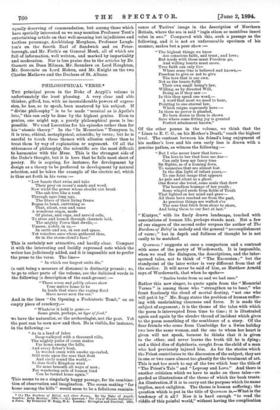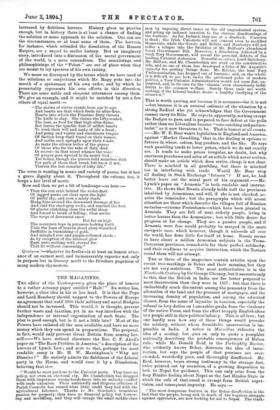PHILOSOPHICAL VERSE.*
THE principal poem in the Duke of Argyll's volume is unfortunately the least pleasing. A very clear and able thinker, gifted, too, with no inconsiderable powers of expres-
sion, he has, so to speak, been mastered by his subject. If "divine philosophy" is to he made "musical as is Apollo's lute," this can only be done by the highest genius. Even to genius, one might say, a purely philosophical poem is im- possible. We read Lucretius for his episodes rather than for his "atomic theory." In the "In Memoriam" Tennyson is, it is true, ethical, metaphysical, scientific, by turns; but he is careful to touch these themes with allusion rather than to treat them by way of explanation or argument. Of all the utterances of philosophy, the scientific are the most difficult to harmonise with the Muse. This is the strongest side of the Duke's thought, but it is here that he falls most short of poetry. He is arguing, for instance, for development by design as a theory to be preferred to development by natural selection, and he takes the example of the electric eel, which is thus set forth in his verse :—
"Low beasts that swim and take
Their prey on ocean's sands and weed, Now wield the power whose shocks can break The oak-tree like a reed.
Through ages long ago, The fibres of their living frame Began to bend, entwining so That, silent, rose and came A wondrous organ, made Of plates, and cups, and nerved cells, To store and launch through channels laid,
The mighty Force that dwells,— Unseen, unfelt, in us,—
In earth and sea, in sun and space, Yet voiceless save where gathered thus, Or in the storm-cloud's face."
This is certainly not attractive, and hardly clear. Compare it with the interesting and lucidly expressed note which the writer has judiciously added, and it is impossible not to prefer -the prose to the verse. The line- " In -which our largest units die," (a unit being a measure of distance) is distinctly prosaic ; so, to go to other parts of the volume, are the italicised words in the following (a description of the sand-grouse) :— "These warm and pebbly colours show Your native home to be
In lands that since the raging flood Have never seen the sea."
And in the lines "On Opening a Prehistoric Tomb," on an -empty piece of crockery,— " Whate'er it held is gone ;—
Some grain, perhaps, as type of food," we have the naturalist, or the archwologist, not the poet. Yet 'the poet can be seen now and then. He is visible, for instance, in the following
As in a land of lakes
Deep-valleyed with a thousand rills,
The mighty pulse of ocean makes Far home among the hills,
And every fisher's boat,
In wooded creek with smoke up-curled, Still rests upon the seas that float
And circle round the world,—
So does God's Kingdom wind Its arms beneath all ways of men ; Far wandering sails of human kind Can be turned home again."
'This seems to us a singularly happy passage, for its combina- tion of observation and imagination. The ocean making "far home among the hills" would seem to be a felicitous reminis-
• (1.) The Burdens of Belief, and other Poems. By the Duke of Argyll. London: John Murray. l894.—(2,) Quorsurn S. The Cry of Human Suffering: 4 Poem. By Frederick W. Ram M.A. London: Bivington and Percival 1894.
cence of Tacitus' image in the description of Northern Britain, where the sea is said " ingis etiam ac montibus inseri velut in suo." Compared with this, such a passage as the following, and it is not an unfavourable specimen of his manner, makes but a poor show :—
"The highest things we know
Are conscious faith, and trust, and love ; But needs with these must Freedom go, And willing hearts must move.
True faith can only live
Where some One is believed and known,—
Freedom to give or not to give The love that is our own.
Not as the beasts fulfil Their own small being's law, Willing, as by directed Will, Doing as if they saw :— In this they speak one word,— A word that most we need to hear, Pointing to one eternal law.
Which reigns supremely here :— In them no power is planted, No born desire in them is shown Save where some fitting joy is granted Perfect attainment known."
Of the other poems in the volume, we think that the "Lines to E. C. G., on his Mother's Death," reach the highest level. The contrast between his friend's long enjoyment of his mother's love and his own early loss is drawn with a genuine pathos, as witness the following
But I who never knew that love— The love to her that bore me due—
Can only keep my fancy true By flights, as of a homing dove, To memories that are almost lost
In the dim light of infant years,—
To one faint image that appears As pale and silent as a ghost. One flower she loved, some souls that drew The boundless homage of her youth ; Some winged seeds from fields of Truth
That lighted on her mind and grew—
All these have reached me from the past, As precious things are wafted o'er The seas that fetch from shore to shore, And bring them to our feet at last."
"Kintyre," with its finely drawn landscape, touched with associations of human life, perhaps stands next. Not a few of our singers of the second order surpass the author of The Burdens of Belief in melody and the general "accomplishment of verse ; " but in depth and fullness of thought he is not easily to be matched.
Quorsum ? suggests at once a comparison and a contrast with some of the poetry of Wordsworth. It is impossible, when we read the dialogues, the descriptions, and the inter- spersed tales, not to think of "The Excursion ; " but the standpoint of the later writer is very different from that of the earlier. It will never be said of him, as Matthew Arnold says of Wordsworth, that when he spoke- " Smiles broke from us and we had ease."
Rather this new singer, to quote again from the "Memorial 'Verses" is among those who "strengthen us to bear," who front fearlessly the cloud of mortal destiny, "not one who will put it by." Mr. Ragg states the problem of human suffer-
ing with n.nshzinking clearness and force. It is made the subject of argument; it is the theme of the tales with which the poem is interrupted from time to time ; it is illustrated again and again by the slender thread of incident which gives to the poem something of the semblance of a story. Of the four Maids who come from Cambridge for a Swiss holiday two love the same woman, and the one to whom her heart is given will not speak, because be thinks that it is given to the other, and never learns the truth till he is dying; and a third dies of diphtheria, caught from the child of a man who had previously injured him. As for the stories which the Priest contributes to the discussion of the subject, they are in one or two cases almost too ghastly for the treatment of art. This is not too much to say of the two which bear the title of "The Priest's Tale" and "Leprosy and Love." And there is another criticism which we have to make on these tales—re- garded as illustrations of the theme of which the book treats. An illustration, if it is to carry out the purpose which its name implies, must enlighten. The theme is human suffering; the question which is put in the title of Quorsum is,—What is the
tendency of it all P Now it is hard enough "to read the riddle of this painful world," without having the complication increased by fictitious horrors. History gives us puzzles enough, but in history there is at least a chance of finding the solution or some approach to the solution. One can see the circumstances, or at least some of them. The horrors, for instance, which attended the dissolution of the Roman Empire, are a sequel to earlier history. But an imaginary story, introduced into a discussion of the moral government of the world, is a mere conundrum. The moralisings and philosophisings of the " Priest " are out of place when they are meant to lay spectres of his own raising.
We mean no disrespect by the terms which we have used of the solutions or conjectures which Mr. Ragg puts into the mouth of a spokesman of his own order, and by which he presumably represents his own efforts in this direction. There are some noble and eloquent utterances among them. We give an example, and it might be matched by not a few others of equal merit :—
" The shrine of virtue stands from age to age, And hearts are that which feeds its altar-fires, Hearts into which the Priestess Duty thrusts The knife to slay. She claims the lofty-souled, The best, as food for that high altar-flame, But leaves the ignoble dust of selfish hearts To work their will and make of life a feast ; And pomp and vanity and slanderous tongue Of faction heap their tinsel on their names, And scribe such epitaphs upon their tombs As make the silence holier of the graves Of those who for the sake of duty died In secret—in that secret whence the voice Of prayer goes upward to its secret God . . . Yes holier, though the graves hold nameless dust For path of those that tread, but know it not, Therein the lost remains of lofty life."
The verse is wanting in music and variety of pause, but it has a grave dignity about it. Throughout the volume, too, it keeps a fair level of merit.
Now and then we get a bit of landscape—as here :—
" Then the sun sank behind the violet-dark
Of jagged peaks cut clear upon the light Of pallid sky, and soon a misty shade Hung blue around the downward throngs of firs And clad the steel-grey rocks, and reached the foot Of glacier clutching close the awful steep And forced to brink of failing; then across The verge of downmost snow. But far on high The mountain tops in pureness looking forth Unto the hues of heaven stood glory-wreathed Ineffable in burnishing of gold, And mingled rose and purple-softened shade ; As by reception of the ethereal glow Rapt unto melting with eternal fire That lit without consuming."
Quorsum ?—whatever its faults—is at least an honest utter- ance of an earnest soul, and immeasurably superior not only in purpose but in literary merit to the frivolous paganism of
many modern rhymesters.







































 Previous page
Previous page